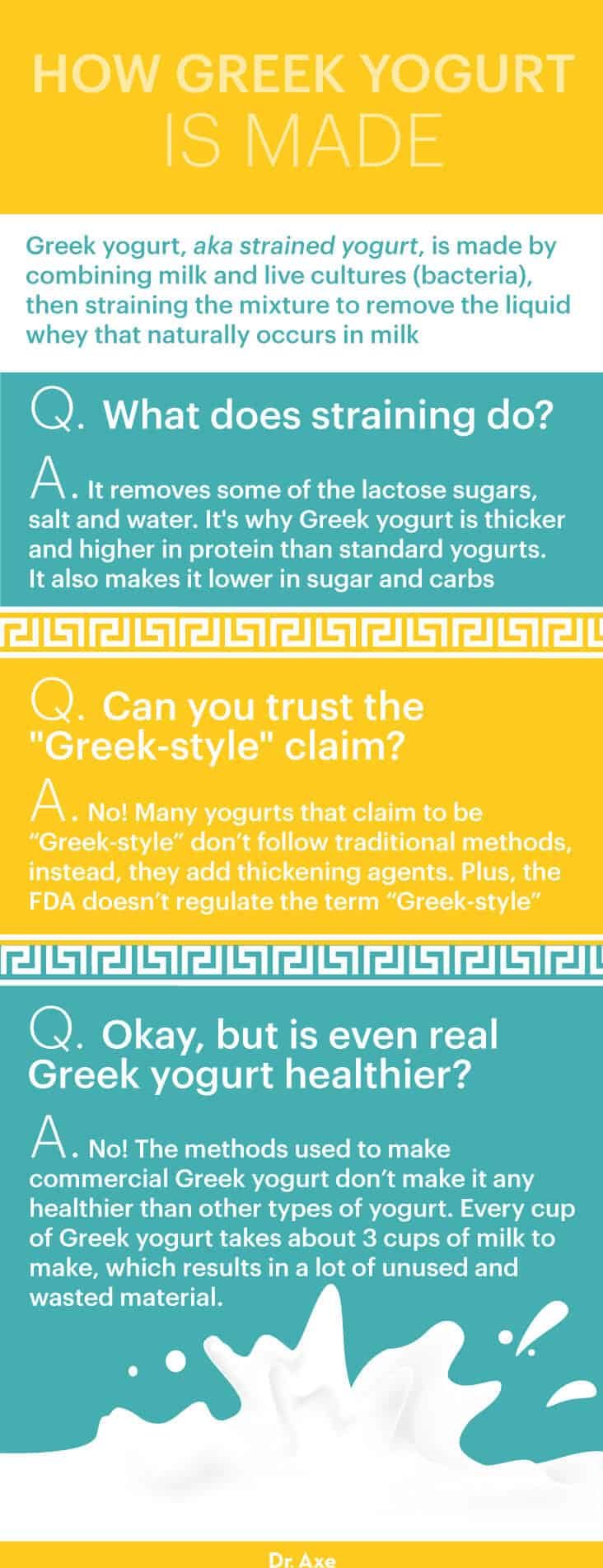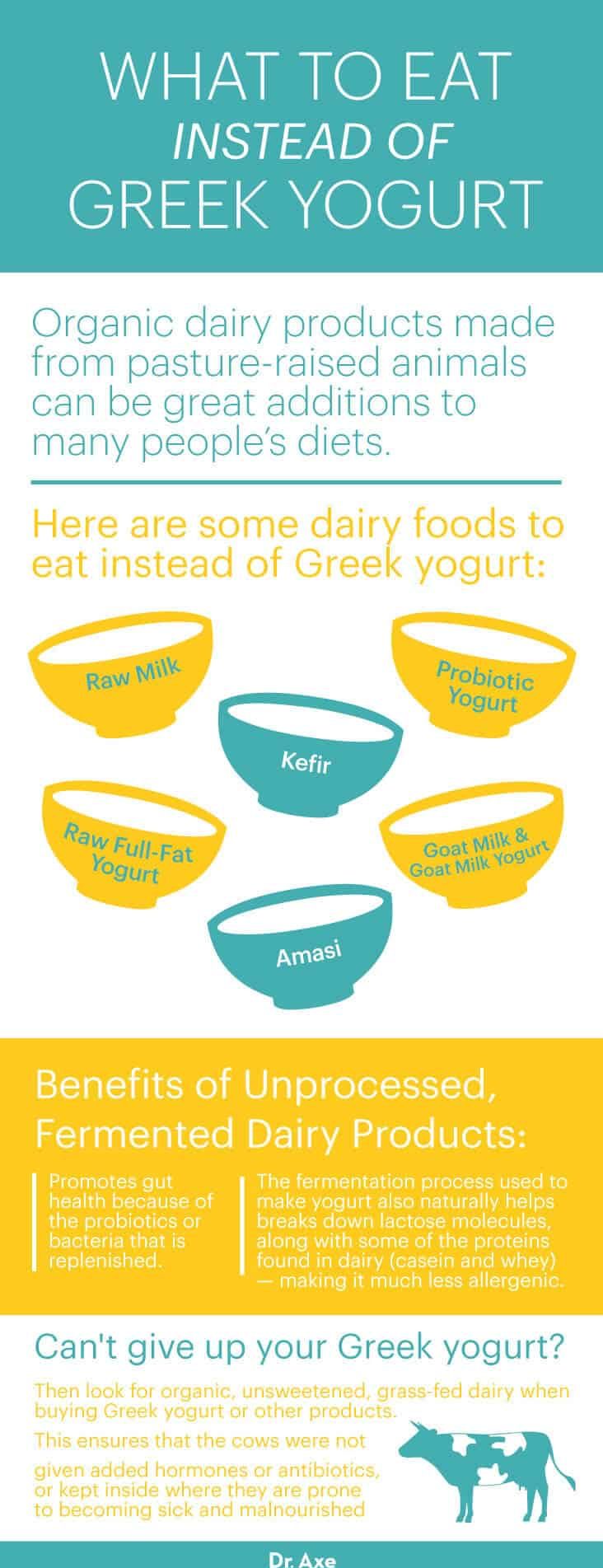
Around the world, dairy is mostly recognized as an important part of a healthy, well-balanced diet. Yogurt is usually the most acclaimed dairy product of all — especially Greek yogurt, which has become more popular than ever over the past decade or so, considering it’s especially high in protein, calcium, selenium and phosphorus.
On the other hand, dairy products, including Greek yogurt, aren’t always all they’re cracked up to be.
In general, dairy can be confusing because it’s high in saturated fat, which is typically portrayed as harmful and tied to high cholesterol levels. In fact, trusted organizations like the American Heart Association have recommended people eat mostly nonfat or low-fat dairy products, including yogurt, for decades.
In addition, more people are concerned with added hormones, sugar, artificial additives, colors or sweeteners that are used to make most store-bought yogurts. Then again, there’s no denying the gut-friendly benefits of probiotic yogurt.
So what’s the verdict when all is said and done — is Greek yogurt good for you or not? Let’s find out.
What Is Greek Yogurt?
Greek yogurt originated in parts of Europe hundreds of years ago, where widely available cow and goat milk were first fermented to prolong shelf life.
This type of yogurt is made by combining milk and live cultures (bacteria), then straining the mixture through a filter to remove the liquid whey that naturally occurs in milk.
What is the difference between Greek yogurt and regular yogurt?
Whey is normally left over when milk curdles. Straining also removes some of the lactose sugars, salt and water, which is why Greek yogurt is thicker and higher in protein than standard yogurts but also usually lower in sugar and carbohydrates.
Today, many yogurts that claim to be “Greek-style” don’t follow traditional methods and instead take shortcuts, like adding thickening agents, such as condensed milk, cornstarch, carrageenan or gelatin. In fact, the U.S. Food and Drug Administration doesn’t regulate the term “Greek-style,” so this actually means practically nothing when it comes to ingredients or preparation.
The methods used to make commercial Greek yogurt don’t make it any healthier than other types of yogurt — in fact, the $2 billion Greek yogurt industry is now tied to environmental concerns related to disposing high amounts of leftover byproducts called whey acids.
Here’s a little-known Greek yogurt nutrition fact: Every cup of Greek yogurt takes about three cups of milk to make, which results in a lot of unused and wasted material that needs to be disposed of. (As a comparison, looking at Greek yogurt vs. regular yogurt nutrition, regular yogurt uses about a quarter of this amount.)
Depending on your tolerability, dairy products in general are potentially problematic foods. A popular Greek yogurt myth is that, basically, it’s healthy. However, most people today are beginning to understand that dairy products, including yogurt, fall in the questionable category since they can be hard to digest for many people — on top of most brands being loaded with junk.
Related: Top 7 Sour Cream Substitute Options & How to Use Them
Greek Yogurt Nutrition Facts
Can you eat Greek yogurt every day as part of a healthy diet? For people who can tolerate dairy well, yes — assuming you choose the right type (especially those low in added sugar) and you can digest milk products well (which includes all types of yogurt).
If this applies to you, then it makes a great snack or breakfast that is high in protein and other nutrients.
Many people enjoy the thick, creamy texture of this yogurt — plus it’s known to provide hard-to-get calcium in addition to several other nutrients, like selenium, phosphorus and potassium.
According to the U.S. Department of Agriculture, 200 grams of unsweetened, whole milk Greek yogurt (about one cup) contains about:
- 200 calories
- 8 grams carbohydrates
- 18 grams protein
- 10 grams total fat
- 24 milligrams selenium (45% DV)
- 274 milligrams phosphorus (22% DV)
- 200 milligrams calcium (20% DV)
- 282 milligrams potassium (16% DV)
- 1.2 milligrams zinc (11% DV)
- 22 milligrams magnesium (6% DV)
- 0.12 milligrams vitamin B6 (6% DV)
- 30 international units vitamin A (1% DV)
Potential Benefits
Dairy isn’t all bad like it might seem. In fact, raw milk is beneficial along with other organic dairy products made from pasture-raised animals (cows, goats or sheep), and they can be great additions to many people’s diets.
Why is Greek yogurt good for you? Let’s look more closely at the potential benefits of consuming this type of yogurt:
1. Excellent Source of Probiotics
Yogurt is one of the most popular probiotic foods in the world. Probiotic yogurt is fermented and has been a time-honored food for thousands of years.
Unprocessed, fermented dairy products are beneficial for gut health because of the probiotics (“good bacteria”) they provide, assuming dairy proteins are not an issue for you. The live cultures active in Greek yogurt usually include bacteria S. thermophilus (St) and L. bulgaricus (Lb), which are responsible for its characteristic sour or tangy taste.
Benefits of adding probiotic foods to your diet can include enhanced nutrient absorption, improved digestion, reduced constipation and diarrhea, and even protection against problems related to colon damage.
In addition to providing bacteria that can help replenish and promote gut health, the fermentation process that is used to make yogurt also naturally helps breaks down lactose molecules, along with some of the proteins found in dairy (casein and whey). This usually means they are easier on digestion than milk — plus they have less of a hormonal response.
Aside from yogurt, kefir is another popular fermented dairy product that holds protective bacteria that’s available to you when you eat it. Amasi is yet another beneficial fermented milk beverage available in some specialty stores that has the consistency of a liquid yogurt.
2. High in Calcium and Supports Bone Health
Yogurt is an excellent source of calcium, which helps strengthen and maintain bone mass. Some yogurts (and other milk products) are also fortified with vitamin D, which promotes calcium absorption and supports proper bone mineralization.
One study found that Greek yogurt consumption helped improve bone health markers in adults following exercise programs when consumed post-workout over a 12-week period.
3. Good Source of Protein
Although all milk products provide some protein, the way in which Greek yogurt is made makes it especially high in protein. Depending on the particular brand, one cup of Greek yogurt can contain between 17 and 24 grams of protein, the equivalent to eating about three to four eggs!
Including enough protein foods in your diet is important for making you feel full, helping build and maintain muscle mass, and for many other functions, such as supporting skin and bone health.
A 2019 study demonstrated that Greek yogurt consumed during a strength-training program resulted in improved strength, muscle thickness and body composition compared to a carbohydrate-based placebo diet.
4. High in Selenium and Phosphorus
Selenium is a nutrient found in yogurt that plays a critical role in reproduction, thyroid hormone metabolism, DNA synthesis, and protection from oxidative damage and infection.
You also obtain phosphorus when you eat yogurt, which is important for building strong teeth and bones, facilitating production and storage if energy, helping muscles recover from exercise, aiding in detoxification, and helping tissues and cells repair and grow.
5. Provides Potassium and Magnesium For Heart Health
Adequate potassium intake, including from dairy products, can play a major role in regulating blood pressure levels. Potassium helps counteract the effects of sodium, which many people consume too much of, and also has other benefits, such as supporting cell and muscle functions, including those involved in heart and neurological health.
READ RELATED: SIMON WALTERS: Why I believe this Budget means Boris Johnson will go to polls in less than two years
Magnesium is another mineral found in Greek yogurt that supports nerve, bone and muscle functions. Consuming enough can help alleviate muscle tension, symptoms of PMS, headaches, constipation and even problems sleeping.
6. Supplies Vitamins A, K and D
Fat is a natural part of milk, and the fat is actually a good source of vitamin A and other compounds that provide benefits for immune health, bone strength, vision and more.
Full-fat dairy from grass-fed cows provides higher levels of two rare nutrients: conjugated linoleic acid and vitamin K2. Conjugated linoleic acid is known to improve immune function and help with weight maintenance and insulin control.
K2 is necessary for many different bodily functions, including building strong bones, teeth and healthy skin.
Although milk/yogurt doesn’t naturally contain vitamin D, many milk products have added/fortified vitamin D, which is not found in many foods. (Our skin makes it when we are exposed to sunlight.) Because so many people lack vitamin D, t’s important to get as much as you can from foods that do offer it.
Related: Kefir vs. Yogurt: How to Decide Which Is Right for You
Downsides (Potential Risks and Side Effects)
What might be bad about Greek yogurt? Despite what most people think, here are several things you need to know about Greek yogurt nutrition, which explains why all types are not as great as you’ve been led to believe:
1. Risk for Lactose Intolerance
Some people can tolerate dairy products well, while others have strong reactions to lactose, casein or other compounds found in dairy that cause them to experience symptoms like acne, diarrhea, bloating and gas.
The bulk of dairy’s health problems come from its natural sugars (lactose) and proteins (whey or casein). Both can be potentially inflammatory, especially when natural enzymes are removed from milk that help with the digestion process.
The lactose in yogurt can cause discomfort for some people who lose the ability to digest lactose after infancy. This results in symptoms of lactose intolerance caused by a reaction to lactose, which is a type of sugar.
Like certain other carbohydrates (such as FODMAPs), when lactose is not properly digested, it can lead to digestive discomfort, bloating, overgrowth of bad bacteria and digestive issues like SIBO.
2. Hormonal Trouble
Conventional dairy farms often use added growth hormones to boost the cows’ production of milk. Even without added hormones, dairy naturally contains some hormones, which can be problematic for people prone to hormonal imbalances.
While some people can benefit greatly from high-quality dairy, it’s worth some experimentation if you fall into a hormone-sensitive category and experience acne, PMS symptoms, irregular periods, etc. Some people, especially women with hormonal irregularities, find that they have better hormonal stability, clearer skin, lighter periods, easier weight loss and better digestion when avoiding dairy.
3. Potential for Acne and Skin Flare-Ups
Lactose intolerance isn’t always the cause for digestive issues from yogurt or milk. Pasteurized and homogenized milk used to make Greek yogurt can also cause histamine reactions and gut problems in some people.
Casein, the other dominant dairy protein other than whey, is capable of triggering an immune response in the form of a histamine reaction, which leads to inflammation, swelling and other signs of allergies. Studies have found that histamine intolerance includes reactions to food allergies like dairy and can cause acne, eczema, hives, rashes, and even asthma or sinus problems.
4. Other Autoimmune Reactions
For people with sensitive digestive systems, lactose, whey or casein can affect the gut in the same way that food allergens like gluten do.
Anyone who has existing damage within the gut environment, including leaky gut syndrome or autoimmune conditions, is especially vulnerable to negative dairy reactions. That’s because once the immune system is triggered by any allergy or sensitivity, it begins to attack the body’s own tissue and raise inflammation levels, making it more likely to see dairy as a threat.
If you have a known intolerance or allergy to gluten (celiac disease) or an autoimmune disorder like Hoshimoto’s disease or arthritis, you could benefit from eliminating dairy and seeing if you notice a decrease in symptoms — like fatigue, brain fog, bloating, aches and pains.
5. Potential for Weight Gain
Most Greek yogurts that are promoted as “healthy” are unnaturally low-fat and have added sugar to make up for the lack of taste.
Even though mainstream nutrition recommendations promote low-fat dairy as healthier than full-fat, removing natural fat from dairy means that other additives need to be used in order to give yogurt an attractive texture and taste — so it usually contains cane sugar, high fructose corn syrup, or artificial sweeteners and ingredients.
Greek yogurt has an especially “tart” taste, so usually it takes even more sugar to appease customers. Dairy already contains sugar naturally, so adding even more means it can cause a bigger insulin response and raise the risk for blood sugar fluctuations, potentially leading to weight gain or even insulin resistance.
Healthier Substitutes
The difference between most Greek yogurts and the type that you should eat has to do with the quality of the milk and process used to make the yogurt.
If you’re interested in including yogurt in your diet, try yogurt made from unpasteurized/raw, organic, whole milk.
Some find that they can tolerate this type of milk even if they have issues with conventional dairy. Why? Pasteurization and homogenization can denature dairy and alter its natural chemical structure, making fats rancid and difficult to digest, while also destroying nutrients and important enzymes.
Pasteurization is the process of heating milk to very high temperatures in order to destroy all disease-causing bacteria and pathogens, but in the process it unfortunately also lowers many nutritional qualities and leads sugar and protein molecules to change form.
Another important factor to consider is the health of the animal that produces dairy. The quality of an animal’s diet and its living conditions have significant effects on the nutritional value of its meat or milk.
Most Greek yogurt that is available in supermarkets comes from cows raised on corn, soy and scrap feed that live in closely packed, industrial dairy-processing plants, where they are never allowed to roam freely on grass. Dairy products from industrially raised cows have a low nutritional value, since the cows are often fed an unnatural diet and kept indoors for the majority of their lives.
What’s a better alternative to these types of conventional yogurts?
Yogurt made from milk of grass-fed cows that were raised in a pasture is best. This type of milk is known to contain a higher percentage of nutrients, including healthy fats like omega-3s.
Healthy cows have a healthier gut environment and obtain more antioxidants in their diets from grass, which means they store and provide more vitamins (like vitamin A and E, for example) within their milk.
Look for organic, unsweetened, grass-fed dairy when buying Greek yogurt or other products. This ensures that the cows were not given added hormones or antibiotics or kept inside where they are prone to becoming sick and malnourished.
Another option is to consider drinking goat milk and buying goat milk yogurt, which tends to cause less digestive discomfort in many people than cows’ milk.
If you’re set on eating Greek yogurt for its higher protein content, look at the main ingredients — you want to see milk and live active cultures but not added protein like “whey concentrates” or thickeners like “modified corn starch.” Be sure it’s free of added sugar, sweeteners, dyes and artificial flavors.
Conclusion
- Greek yogurt is a type of fermented and strained dairy product. It is relatively low in calories but high in protein, plus is excellent source of probiotics and minerals, such as calcium, selenium and phosphorus. It’s also a great way to add other nutrients to your daily diet, such as magnesium and potassium.
- Is Greek yogurt good for you? Health benefits of Greek yogurt include providing gut-friendly microbes called probiotics, assisting in digestion (for some people), supporting healthy blood pressure and aiding in bone health.
- On the other hand, dairy products, including Greek yogurt, aren’t always all they’re cracked up to be. Many products have added hormones, sugar, artificial additives, colors or sweeteners.
- The best type of yogurts are those made from milk of grass-fed cows that were raised on organic pasture. Ideally, you want to consume organic, raw (unpasteurized) yogurt made with whole milk. Be sure it’s free of added sugar and artificial sweeteners and additives.
Source:









